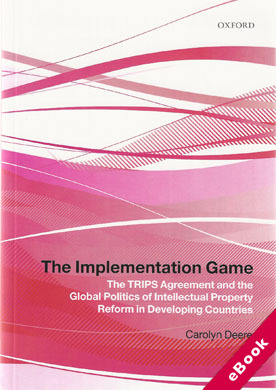
The device(s) you use to access the eBook content must be authorized with an Adobe ID before you download the product otherwise it will fail to register correctly.
For further information see https://www.wildy.com/ebook-formats
Once the order is confirmed an automated e-mail will be sent to you to allow you to download the eBook.
All eBooks are supplied firm sale and cannot be returned. If you believe there is a fault with your eBook then contact us on ebooks@wildy.com and we will help in resolving the issue. This does not affect your statutory rights.
With the launch of the World Trade Organization (WTO) in 1995, its Agreement on Trade-Related Aspects of Intellectual Property Rights (TRIPS) emerged as a symbol of coercion in international economic relations. In the decade that followed, intellectual property became one of the most contentious topics of global policy debate. This book is the first full-length study of the politics surrounding what developing countries did to implement TRIPS and why.
Based on a review of the evidence from 1995 to 2007, this book emphasises that developing countries exhibited considerable variation in their approach to TRIPS implementation. In particular, developing countries took varying degrees of advantage of the legal safeguards and options-commonly known as TRIPS 'flexibilities'-that the Agreement provides.
To explain this variation, this book argues that TRIPS implementation must be understood as a complex political game played out among developing country governments and a range of stakeholders-developed countries, non-governmental organisations (NGOs), intergovernmental organisations (IGOs), and industry groups. The contested nature of the TRIPS bargain spurred competing efforts to revise the terms of TRIPS and to influence global IP regulation more broadly.
The intensity of the implementation game was amplified by an awareness among the various stakeholders that the IP reforms developing countries pursued would influence these ongoing international negotiations. The book attributes the variation in TRIPS implementation to the interplay between these global IP debates, international power pressures, and political dynamics within developing countries. The book includes historical analysis, compilations of evidence, and analysis supported by examples from across the developing world.
The Implementation Game will be of interest both to scholars of international relations, law, and international political economy as well as to policymakers, commentators, and activists engaged in debates on the global governance of intellectual property.